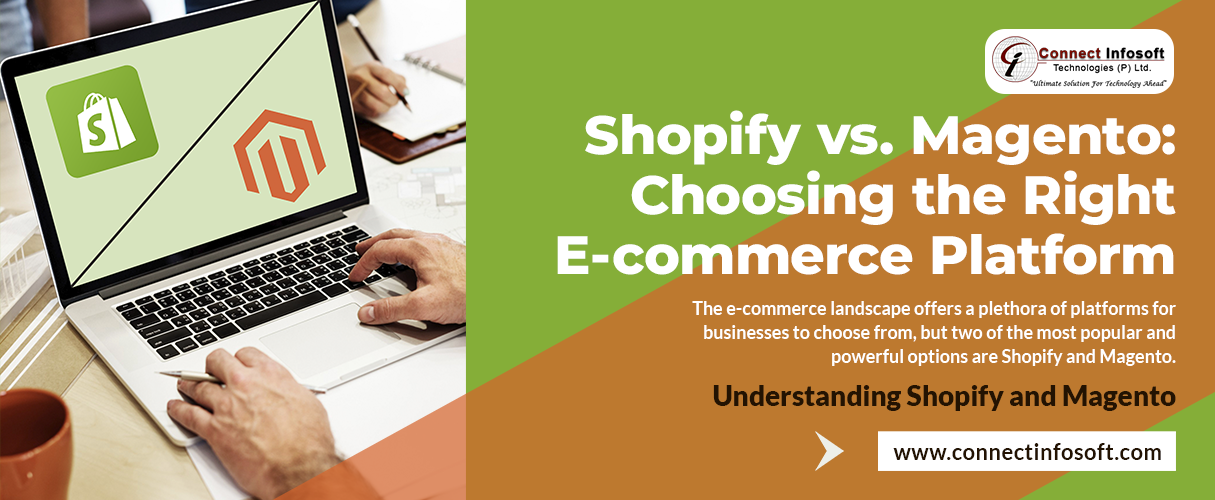Shopify vs Magento: Choosing the Right E-commerce Platform

The e-commerce landscape offers a plethora of platforms for businesses to choose from, but two of the most popular and powerful options are Shopify and Magento. If you find yourself stuck in the Shopify vs. Magento dilemma, you're not alone. Each platform offers unique features and benefits, making the decision a crucial one for your business.
Understanding Shopify and Magento
Shopify:
Shopify is a leading cloud-based, fully hosted e-commerce platform that empowers businesses of all sizes to set up an online store quickly and easily. With its user-friendly interface and a wide range of customizable templates, Shopify is a popular choice for beginners and small to medium-sized businesses looking to establish an online presence swiftly.
Key features of Shopify include:
- Ease of Use: Shopify is well-known for its simple and user-friendly interface. Setting up a store, managing products, and processing orders are streamlined processes on this platform.
- App Store: The Shopify App Store offers a vast array of apps and integrations to enhance your store's functionality. From marketing tools to inventory management, you can find solutions to meet your specific needs.
- Hosting and Security: Shopify takes care of hosting and security, ensuring that your store is reliable, fast, and secure, without the need for additional configurations.
Magento:
Magento is an open-source e-commerce platform that provides unparalleled flexibility and scalability for businesses with complex requirements. Magento is highly customizable and is favored by larger enterprises and businesses with unique needs.
Key features of Magento include:
- Customization: Magento allows for deep customization, making it ideal for businesses that require tailor-made solutions. From design to functionality, every aspect of a Magento store can be personalized.
- Scalability: Magento is built to handle large amounts of products and traffic, making it a suitable choice for growing businesses with expanding needs.
- Community Support: Being open-source, Magento benefits from a large community of developers and users who contribute to its development. This community assistance might be essential when confronting difficulties or seeking advice.
Comparing Key Aspects: Shopify vs. Magento
To understand the core differences between Shopify and Magento, let's break down their features and functionalities across several key aspects:
1. Ease of Use
Shopify:
- User-Friendly: Shopify's user-friendly interface makes it simple for anybody, even those without technical knowledge, to set up and operate an online business.
- Quick Setup: With its pre-built themes and drag-and-drop builder, Shopify enables a fast and efficient store setup process.
- Managed Hosting: Shopify takes care of hosting, security, and maintenance, allowing business owners to focus on their products and sales.
Magento:
- Steeper Learning Curve: Magento's extensive customization options require a higher level of technical knowledge, making it more challenging for beginners.
- Customization Flexibility: While the setup process can be complex, Magento offers unparalleled flexibility in design and functionality for those who have the technical skills.
- Self-Hosting: Businesses using Magento Open Source must manage their hosting, security, and updates, which can be resource-intensive.
2. Customization and Flexibility
Shopify:
- Themes and Apps: Shopify offers a wide range of professionally designed themes and a robust app store to extend functionality.
- Limited Customization: While Shopify provides customization options, they are more limited compared to Magento, making it less suitable for highly complex or unique requirements.
Magento:
- Unlimited Customization: Magento's open-source nature allows for complete control over the design and functionality of the store, making it perfect for businesses with specific needs.
- Advanced Features: Magento supports advanced features like multi-store management, extensive product attributes, and custom integrations, offering unmatched flexibility.
3. Scalability
Shopify:
- Seamless Scalability: Shopify is designed to grow with your business, offering various plans that cater to different business sizes and needs.
- Managed Infrastructure: Shopify's hosted solution ensures that the platform can handle increased traffic and transactions without additional configuration from the user.
Magento:
- High Scalability: Magento is known for its ability to handle large-scale operations and complex catalogs, making it suitable for enterprise-level businesses.
- Performance Optimization: However, scaling with Magento requires careful performance optimization and server management to ensure smooth operation.
4. Cost
Shopify:
- Subscription-Based Pricing: Shopify offers a range of subscription plans, from Basic to Advanced, with monthly fees that cover hosting, security, and support.
- Additional Costs: While the upfront costs are predictable, additional expenses can arise from premium themes, apps, and transaction fees.
Magento:
- Free and Paid Versions: Magento Open Source is free to use, but businesses must cover hosting, security, and development costs. Magento Commerce comes with a higher price tag, offering additional features and support.
- Development Costs: Customization and maintenance often require a dedicated development team, leading to higher long-term costs.
5. SEO and Marketing
Shopify:
- Built-In SEO Tools: Shopify includes essential SEO features like customizable title tags, meta descriptions, and a blogging platform.
- App Integrations: Numerous marketing apps are available to enhance email marketing, social media integration, and customer engagement.
Magento:
- Advanced SEO Capabilities: Magento offers advanced SEO features and the ability to customize URLs, meta tags, and rich snippets, providing greater control over SEO strategies.
- Comprehensive Marketing Tools: With extensive marketing features, including customer segmentation, abandoned cart recovery, and personalized promotions, Magento supports sophisticated marketing campaigns.
6. Support and Community
Shopify:
- 24/7 Support: Shopify provides round-the-clock customer support via chat, email, and phone, ensuring assistance is always available.
- Extensive Documentation: A wealth of tutorials, guides, and a vibrant community forum help users navigate the platform.
Magento:
- Community Support: The Magento community is vast, offering forums, user groups, and extensive documentation for troubleshooting and support.
- Paid Support: Magento Commerce users have access to dedicated support from Adobe, ensuring professional assistance when needed.
Conclusion:
Choosing between Shopify and Magento depends on your business's specific needs, technical expertise, and long-term goals. Shopify is ideal for companies seeking a user-friendly, all-in-one solution with managed hosting and support. It's perfect for small to medium-sized companies that want to get up and running quickly without extensive technical resources.
On the other hand, Magento offers unparalleled customization and scalability for businesses with complex requirements and the ability to manage a self-hosted platform. It's suited for larger enterprises or those with specific needs that a more restricted platform can't meet.
Ultimately, both platforms have their strengths and can support your e-commerce journey. By carefully considering your business's unique requirements and capabilities, you can make an informed decision that sets the stage for long-term success in the competitive world of e-commerce.


